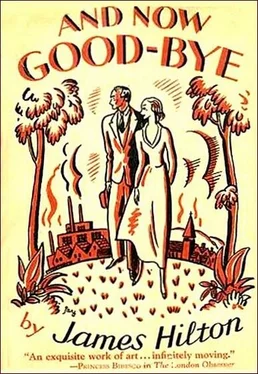Her laughing was almost hysterical now. “Oh, poor Isaac—how funny he’d think it all if he knew! He plays the fiddle at a cinema in Manchester; he’s married and has three children, I think—or perhaps four. He’s a dear old man, and a very great friend of mine. He saw me off at the station because I had a lot of luggage to handle, and before the train started we sat in the compartment together and talked. I suppose that must have been when people saw us.”
Howat could only stammer: “You must forgive me, forgive me.”
“Why, of course, if there were anything to forgive. It’s Browdley that’s to blame, not you. Anyhow, it doesn’t matter. It all makes me rather more determined that ever not to go back.”
“You’re not going back? You still say that?”
“Still? Why do you think I ought to change my mind?”
“I—I don’t know—except that I’m sure that your parents, now that this horrible story turns out to be untrue—would be very glad—very glad indeed—to have you back.”
“I’m not sure that they would, and in any case, I wouldn’t be glad at all. You don’t seem to realise that I don’t want to go back. I’ve got all sorts of other plans. I’m going to Vienna to study music. Didn’t you hear that? Weren’t there any true rumours flying about?”
“ Music? ”
“Yes.”
They stared at each other across the table amidst a curiously fateful silence. She continued, with sudden eagerness: “Oh, I’m so pleased we’ve cleared up all that stupid misunderstanding—we can talk to each other now just as I’ve wanted to for a long time. I was often on the point of telling you during those German lessons, but you never gave me the least encouragement—I had an impression you weren’t interested in me and my affairs. But you’re different now—I can see that—I suppose it’s because you’re out of Browdley. Anyhow, I must tell you all about it now that we’re here together. Do you mind?”
At first she had been aloof, baffling, cordial but on the defensive; now, however, the armour dropped and a warm friendliness took its place and made him exclaim: “Mind? Good heavens, no! I want to be told the whole story—especially about the music. I’m rather interested in music myself, but I’d no idea you were. What is it, the piano?”
“No, the fiddle. I’ve always been keen, ever since I was a child. There was a fiddle at our house that used to belong to an uncle of mine who died, and I taught myself to play on that. I never had any lessons at first; my father didn’t believe in that sort of thing. As a matter of fact, though perhaps you’ll smile and won’t believe it, I have an idea he thought all music, except hymn tunes and funeral marches, rather irreligious.” Howat certainly did smile, and she went on, as though encouraged: “When I was fifteen I wanted to earn a living somehow or other, so I got a job in the town library—the usual graft, you know, father being a Councillor. It wasn’t at all a bad job, and it gave me a chance of reading all sorts of books as well as studying music in my spare time. As soon as I could afford it I began having lessons from Isaac in Manchester—his real name’s Isaacstein, but everybody calls him Isaac—I used to go once a week till he said he’d give me two lessons for the same money. He’s really been awfully kind and generous, and he’s quite a marvellous teacher. I wish you knew him. Well, all this has been going on now for some years; I’ve been improving my playing, I think, and I must admit I’ve been fairly happy all the time, only—only—” Her fluency ceased, and she gave him a queer abrupt smile across the table. “Only it isn’t any longer enough to satisfy me. I could never get anyone to realise that, except Isaac. It’s really not much use, is it, being fairly comfortable in what you’re doing, if there’s something else you want so dreadfully that you’re willing to put up with all the discomforts in the world for it?”
“I know. I think I can understand that.”
“That’s how I feel about music. It’s probably quite ridiculous of me, but I don’t care—other people are constantly doing things which I think ridiculous.”
“It’s a difficult profession, of course.”
“I know that. I’m prepared for all sorts of hardships, because I’m so certain in my own mind that they could never make me as unhappy as staying at home in Browdley. Besides, though it may seem a conceited thing to say, there is something in me. Musically, I mean. Even Isaac thinks there is. If I give myself a chance I might, some day, do something worth doing. Haven’t you ever felt like that about anything?”
He did not answer, but said, instead: “What I’m rather puzzling over is why you didn’t tell all this to your parents before you left. It seems such a pity to have needlessly quarrelled with them.”
“But there was no quarrel—not on my side, at any rate. I told them I was going to live abroad, and I was quite ready and willing to give them the fullest details about it, but they wouldn’t listen. I believe I did tell them a few things, but they obviously didn’t believe me. When I saw it was no use talking to them any more, I just went to bed, packed up my things during the night, and caught the first train in the morning.”
“Wasn’t that rather precipitate?”
“What else could I have done? They wouldn’t believe me or even listen. They never understood how I could be so keen on music, and I don’t think they ever believed that when I went to Manchester so often in the evenings it was only for fiddle lessons. Recently, too, I’ve been doing most of my practising in Manchester, in a room belonging to a music-shop, because they didn’t like the noise of it at home. Of course it is rather an awful noise sometimes, I admit.”
“It seems a pity, though, that you couldn’t have convinced them that it was all quite genuine.”
“I often tried, I assure you. But in the end I just had to give up bothering. After all, if people want to think things of that sort…” She shrugged her shoulders and added: “I’m afraid you must think me very cool and ruthless about it. I dare-say you’d understand better if you knew my parents.”
He said, more gently: “I do know them, a little. I can understand they were not very—sympathetic…Now tell me, what’s given you this idea of going to Vienna?”
“I want to join a school there. Isaac says it’s the best school in Europe, except one in Berlin, which I couldn’t afford. Ail sorts of people attend the classes—men and women of all ages and from all countries. I have to pass a kind of entrance examination first of all, but Isaac says I’ll do that quite easily.”
“Has this Mr. Isaacstein—is that it?—has he been encouraging you in all these ideas?”
“No. He says, as you say, that it’s a fearfully hard profession, and that I’m taking a big risk in giving up home and a job. But he likes my playing, all the same, and thinks there’s about a hundred to one chance that I’ll turn out pretty good.”
“A hundred to one in your favour?”
’No, against me, of course.”
“That doesn’t sound very optimistic.”
“He isn’t optimistic, he just means everything he says.”
“And, assuming he’s correct, are you satisfied with such a chance?”
“I’ve got to be, haven’t I? It’s either that or no chance at all.”
“What exactly will you do in this school?”
“Play the fiddle every day for hours and hours. Have lessons—perhaps from somebody of importance if I’m lucky. Eventually, if the hundred to one chance comes off, I’ll begin giving recitals.”
“Even that doesn’t necessarily mean success. There are scores of recitalists one never hears of.”
Читать дальше











